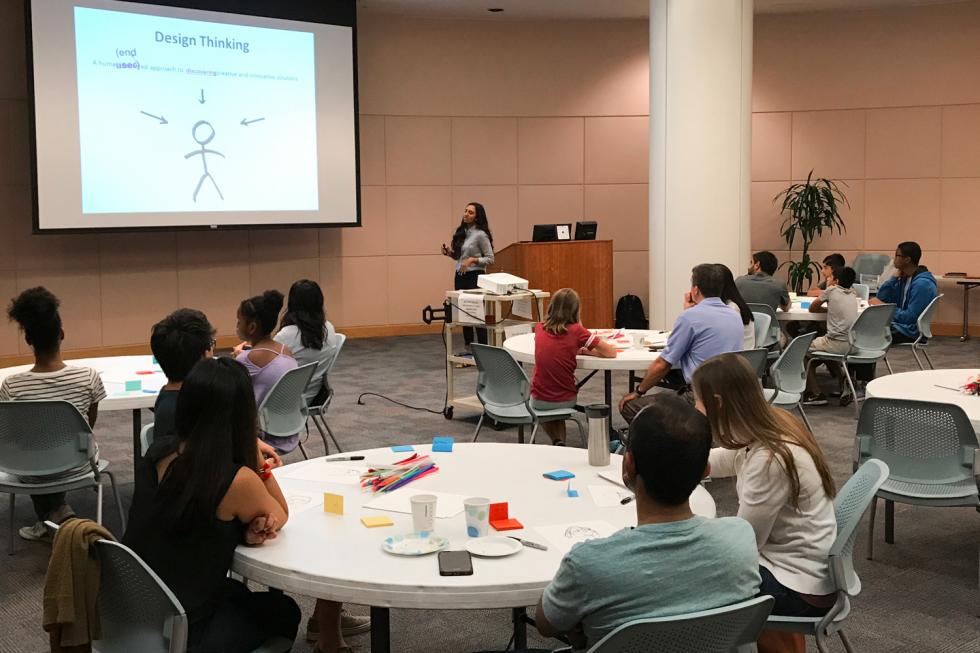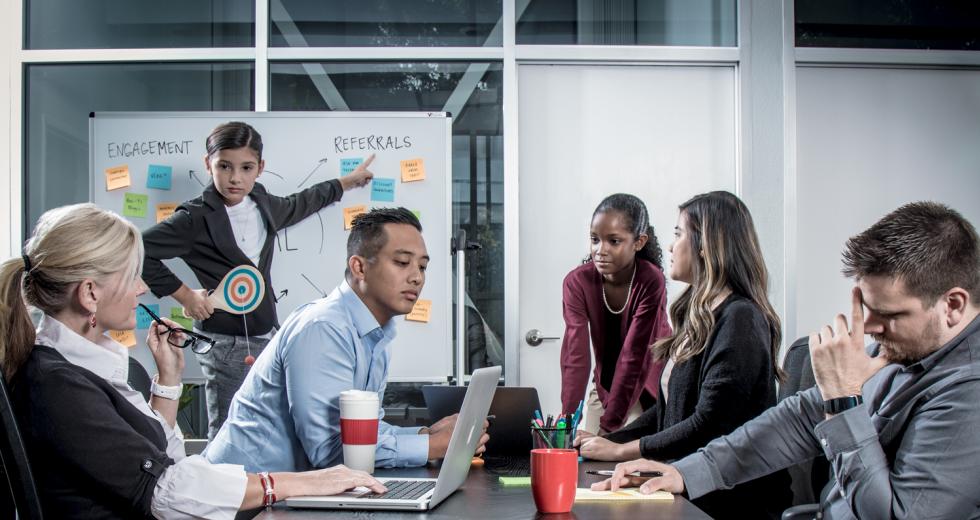Sahej Claire and her parents gathered around the kitchen island to sketch out the high school sophomore’s summer plans. It was early in 2016, and the soon-to-be 16-year-old had set her sights on finding a camp that would nurture her creative streak and help her develop skills in innovation and entrepreneurship. But the Rancho Cordova family’s search came up empty.
“[The programs] were either way too far away — as in across the country — or insanely expensive,” she recalls. “We were just like, ‘This is not feasible at all.’”
Even as a teen, Claire could sense that the creativity and critical thinking required to launch a successful company would be crucial for competing in today’s economy. So she set out to share those lessons with her peers — and absorb them herself in the process.
With the help of her parents, she founded Project Incubator, a camp for high schoolers focused on design thinking and entrepreneurship. For five days, she honed her own skills by schooling her peers on how to take an idea from concept to prototype, write their own business plan and more. At the time of its launch in 2016, she felt her program was one of the only local options for students looking to scratch an entrepreneurial itch.
“They’re the people that move more, that get promoted more, that do more cross-functional types of activities. They tend to be the people who lead change and innovation in the corporate environment.” Laura Good, co-founder, Startup Sac
Just a few years later, there are signs that’s starting to change. Offerings for youth looking to gain crucial entrepreneurship skills are evolving and expanding. Across the U.S., schools, summits and “Shark Tank” segments are giving business-minded youth a leg up years before they even get a learner’s permit. In the Capital Region, newer initiatives like Sacramento State’s Summer Academies Entrepreneurship and Innovation program for high school students, introduced this year, and Sac Makers, a hands-on program with a range of daytime, summer and after-school classes that has more than tripled its participation in recent years, have joined long-established organizations such as Junior Achievement in trying to fill what creators say is a growing appetite for such trainings.
“Over the past few years the numbers have grown and grown,” Claire says of programs like hers aiming to fill the previous gap. “The demand never goes away.”
The shift isn’t just fueled by business-savvy kids drawing inspiration from startup founders who attract rock-star-level fan bases and their fellow mini moguls generating cash (and fame) on TV and online. Learning entrepreneurial skill sets — and mindsets — from a young age is increasingly seen as an essential component of a comprehensive education. The goal isn’t just to inspire (and train) the next Mark Zuckerberg or Kylie Jenner. It’s to ensure the future success of a generation.
MUST-HAVE SKILLS FOR MINI MOGULS
The American workforce has changed, and it’s never going back. The traditional trajectory of decades spent climbing the ladder at the same company no longer exists. Self-employment, whether that’s starting a company or working as a freelancer, is booming. The number of self-employed individuals in the U.S. hit 8.7 million in early 2017 — up 150,000 from 2014 and representing about 7 percent of the total workforce. When freelancers and contractors are added to the mix, the figure edges closer to one third. Some estimates project that 40 percent of the workforce will be self-employed or working as an independent contractor by 2020.
Given those trends, providing students tools to navigate the world of business creation and ownership is crucial. Entrepreneurs need creative-thinking capabilities, financial acumen and resilience in the face of failure. And such lessons aren’t just helpful for future founders, experts say. Whether students aim to join Silicon Valley’s club of $10 billion startups, work as a consultant or sole proprietor, or climb the corporate ladder, skills that make for a successful entrepreneur also make someone a good employee (not to mention person).
Sahej Claire introduces the concept of design thinking at a
workshop she held at Shriners Hospital for Children last year.
photo: Simi Claire; courtesy of Sahej Claire

Laura Good, co-founder of StartupSac, says the same instincts that drive an entrepreneur to success can help develop “people who go beyond the job description” to make their career and the company better.
“They’re the people that move more, that get promoted more, that do more cross-functional types of activities,” Good says. “They tend to be the people who lead change and innovation in the corporate environment. They’re not going to be satisfied doing the same thing day in and day out.”
Seung Bach, a professor of entrepreneurship at Sac State who led the inaugural Summer Academies in 2018, says all students, regardless of their career goals, need to learn how to think like a savvy business owner. The program focuses on the brass tacks of business creation, from coming up with a market analysis and a minimum viable product to actually building a pitch deck. For a week this summer, more than a dozen students enrolled in the program heard from Bach and other expert instructors and guests, visited a local “innovation facility,” and came up with a product plan of their own. Bach also wanted to illuminate the behind-the-scenes work that goes into those rags-to-riches tales children hear in the news of founders going from college dropout to multimillionaire in six months.
“High school students tend to think that in order to have a successful business, I have to come up with a finite product, a really good one-of-a-kind no one else can think of, otherwise I won’t be successful. That’s not the case,” Bach says. “When you’re looking closer to reality, being a successful entrepreneur takes time. It’s a sometimes tedious process.”
Leanne Bernales, a senior at Elk Grove High School, learned that firsthand when she participated in the Sac State summer program. Bernales, 16, says she found the complexity of starting a business “surprising, exciting [and] kind of scary all at once.”
“We talked to one guy who started his own company, and he talked about how it’s not like you’re going to be successful right off the bat,” she recalls. “You’re going to meet 100 failures maybe, and then you might find something that works. It’s just a reality of it.”
In Claire’s eyes, that experience of falling short is one of the biggest benefits of being exposed to entrepreneurship at a young age. A willingness to fail, she’s found, helps develop creative confidence in the students she has mentored and trained.
“Once they find it, it opens so many avenues and opportunities for them,” Claire says. “They’re really not afraid to try things out.”
Related: El Dorado County teen finds business success the old-fashioned way
Related: Former Sac High students ace their business plan
The ability to adapt is a lesson she has learned firsthand: Claire’s inaugural summer camp spanned a week and served only seven high school students. Since then, she’s found she can reach more students and be more effective by partnering with local organizations for one-day workshops that serve a broader (and even younger) audience. A Girl Scouts conference workshop designed “to encourage more young women to be confident creative thinkers who are unafraid to fail” attracted 40–50 girls in 2017. Later that year, she brought together students, parents and care providers at Shriners Hospital for Children to come up with ways to make the vaccination experience better for young patients. She’s also held programming for underserved communities, including migrant children from seasonal farmworker families and homeless youth.
“I wanted to take this farther, make it bigger,” she says. “Reaching more kids was my main goal.”
ENTREPRENEURIALISM FOR ALL AGES
Robert Calvert, the president and founder of Sac Makers, is also seeing an increased demand for entrepreneurial programming geared toward youth. He estimates that 80 percent of the sign-ups for his classes are driven by interest from the students themselves, who range in age from 10–18. His courses, which include board game design, programming and 3D modeling, are offered in several formats. There are daytime courses for homeschool charter students, after-school sessions that span several weeks and summer camps.
“There are a lot more programs today than there were three years ago. It would have been hard to find anyone who was doing what I was doing three years ago within a 50-mile radius,” Calvert says. “I don’t know that we’ve met the total demand — it’s definitely a lot closer than it used to be — but the demand’s definitely gone up.”
And when it comes to teaching entrepreneurial skills, supporters say an early start is key. Junior Achievement Sacramento, the local arm of the national entrepreneurship, financial literacy and work-readiness organization, sets out to give kids a “real understanding of what it means to be a real entrepreneur” as early as kindergarten, President Susan Nelson says. By third grade, participants are putting together a business plan. The benefit of starting at that point is that younger children see no limits. “Right away, they self-identify with the entrepreneur; you can see all those light bulbs go off, and that’s fantastic,” Nelson says.
That exposure can be life-changing for the young people who participate in Junior Achievement’s programming. “That baseline of understanding what entrepreneurship is is critical for all students to be aware of and integrate into the choices they make, whether they become entrepreneurs or not,” Nelson says.
To meet that goal, and increasing demand, the nonprofit has focused on expanding its offerings to include a wider variety of programs for youth at different age levels. It now serves just under 13,000 K-12 students across the region — up from about 8,900 five years ago — and offers 12-week after-school programs, lesson plans intended to be integrated into the classroom, and one-time school visits from local startup owners who can provide a brief “intro to entrepreneurship,” Nelson says.
“Student could live just as rich and successful lives, more so now than ever, by developing a business and finding a way to creatively live and earn without going to college.” Tyler Millsap, principal, Da Vinci Charter Academy
At the high school level, ongoing programming focused on entrepreneurship can help shape students’ career pathways and college decisions. Da Vinci Charter Academy in Davis has made creating a business proposal a graduation requirement. As part of their senior project, students collaborate to pitch an idea to a panel of judges. (Like Sac State’s summer academy, the idea was inspired by ABC’s “Shark Tank,” a show where founders pitch their businesses to a panel of big-name investors.) Principal Tyler Millsap says the goal is to expose students to “skills that are applicable and relevant across all kinds of business or entrepreneurial experiences,” including communication and project management.
Millsap has seen the excitement that comes from students realizing they already have the makings of a viable business, or when judges express genuine interest in exploring final proposals as actual business concepts. Even when the businesses don’t take off, the lessons gleaned through the process are important.
“It’s really important that students think about other pathways,” Millsap says. “Students could live just as rich and successful lives, more so now than ever, by developing a business and finding a way to creatively live and earn without going to college.”
LEARNING FIRSTHAND
As much as instructional programs can do, there’s no substitute for the real thing. Fourteen-year-old Jake Van Ry caught the business bug and launched his own, now booming, lemonade and hot dog stand after appearing on a Food Network competition several years ago.
His parents, entrepreneurs themselves who own a gymnastics studio and a food trailer, say the experience has taught the high schooler valuable lessons about time and money management, supply and demand, and the importance of reinvesting in his business. After seeing other food trucks score big sales with frozen lemonade, for example, he decided to spend some of his earnings on a Vitamix to debut his own recipe. His parents, Andrea and Michael, hope those lessons will translate to his future work.
After noticing the popularity of lemonade at food truck events,
14-year-old Jake Van Ry reinvested in his business to debut his
own recipe. photo: Joan Cusick

“[He’s learned] leadership in general, being organized, work ethic, knowing from a young age just how to critically think and [find] out answers to questions you need,” Andrea Van Ry says. “The critical-thinking aspect is so beneficial, no matter what you’re going to do.”
Jake’s school doesn’t offer an entrepreneurship focus in class or as an extracurricular club, and it’s something his parents would welcome. Now that he’s discovered the thrill of running a business, keeping him engaged with homework and class is more of a challenge. “These kids are ready so much earlier,” Michael Van Ry says. “To learn what return on investment is, is to learn what equity is, they can learn so much earlier, they’re so advanced.”
That’s why Calvert, of Sac Makers, has made investing in student businesses a central component of his program. Each course costs $300, but students have the opportunity to get some of that money back if the entrepreneurship bug bites.
Calvert encourages students to pitch him on a business idea. If their proposal is viable (and free of grammatical and spelling errors), he’ll give them startup cash to invest in a prototype. Recently, he awarded one 16-year-old participant $150 to purchase supplies to launch a custom skateboard line based on comics the teen designed himself.
“He’s got a website with his logo and different things he sells, [and] he’s developing relationships with skate shops,” Calvert says. He sees the opportunity to experiment as essential, even if the companies don’t eventually take off. “Being 16 is a good time to try and fail. If you succeed, it’s wonderful. If not, your wife and kids aren’t depending on you for their next meal.”
Claire, who is just starting her freshman year at Stanford University, agrees. She’s yet to decide a major or a future career path. And while she hopes to continue to offer Project Incubator workshops when times allows, she doesn’t know if starting more businesses is in her future. But in her eyes, that early exposure to starting and running a company will prove invaluable, no matter what she does as an adult.
“There are so many skills that I learned by just having to be proactive and managing my time and being responsible that I don’t think I ever would have learned if I had just gone to school, done my homework and tried to get a good grade,” Claire says. “Life skills can’t really be taught outside of life.”




Comments
Excellent article and totally agree!